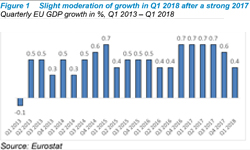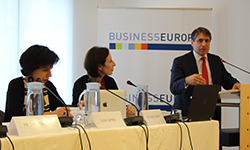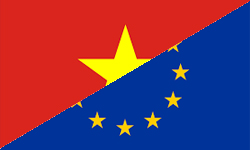BusinessEurope Headlines No. 2018-24
Austrian Chancellor Kurz addresses the European business community

Together with the Chancellor of Austria, Sebastian Kurz, European Commissioner Johannes Hahn and the President of the Federation of Austrian Industries (IV) Georg Kapsch, BusinessEurope President Emma Marcegaglia participated in the IV Summer Reception organised on 27 June in Brussels, in view of the start of the Austrian EU Presidency. During her intervention, President Marcegaglia stressed that “to remain a global player, the EU needs to be united, strong and smart. We must tackle protectionism and for that the EU must remain committed to open, fair and rules-based trade and, at the same time, strengthen the European Union to adequately protect the interests of its companies and its citizens”. Marcegaglia added that “the EU needs more than ever to show leadership. It needs to demonstrate that it stands by a rules-based trade system and supports the role of the World Trade Organisation (WTO). It should work together with like-minded countries in promoting reforms and creating rules that are fit to the trade and investment reality of the 21st century”.
Contact: Daniele Olivieri
Video message against protectionism
Business leaders speak up in support of free and rules-based trade
Our comment
EU growth at risk of peaking
By Frederik Lange, Economic Affairs Advisor
 After strong growth of 2.4% in the EU in 2017, the highest in more than a decade, as our recent Spring Economic Outlook highlights, businesses are increasingly concerned that growth is at risk of peaking and about to slow down.
After strong growth of 2.4% in the EU in 2017, the highest in more than a decade, as our recent Spring Economic Outlook highlights, businesses are increasingly concerned that growth is at risk of peaking and about to slow down.
Recent official data points to a slight moderation of growth at the beginning of 2018, with Eurostat reporting that EU quarterly GDP growth fell to 0.4% in the first three month of this year; a clear slowdown from the very strong 0.6-0.7% quarterly growth during 2017. Whilst such a fall might be due to temporary effects such as the very cold winter, we have also seen a broader decrease in business confidence suggesting more permanent factors may be at work. In particular, business federations are concerned about a shortage of relevant skills in the EU, which is increasingly acting as a constraint on their expansion plans.
Nevertheless, since the recent drop in confidence comes from very high levels and is for the moment still relatively small, and since improving labour market conditions and still relatively accommodative monetary policy remain in place, we expect EU GDP growth of 2.4% for 2018, and then a slowdown to 2.1% in 2019. In order to address labour market mismatches, we believe that work-orientated learning for all age groups must be improved, including the promotion of digital skills. In addition, reforms are needed which help encourage people to stay longer in the workforce and ensure to properly integrate legal migrants into the workforce.
Our Economic Outlook also emphasises that the greatest risk to both the EU and global economy increasingly stems from growing protectionism and unilateral action taken outside the multilateral trading system. Our in-depth analysis identifies a number of studies from major international institutions, all showing the potential significant damage in terms of global growth in the event of a full trade war.
For example, the International Monetary Fund (IMF) notes that a broader application of tariffs such as a 10% increase in import prices (on goods) across countries, could lower global output by about 1.8% after 5 years and by close to 2% in the long-term, with the Organisation for Economic Co-operation and Development (OECD) last month warning that the threat of trade restrictions was already reducing confidence, and, if implemented, could negatively affect investment and jobs. It is clear that we are currently at a turning point in the global trading system. The EU must remain committed to open, fair and rules-based trade, and, at the same time, stay united and committed in adequately protecting the interests of its companies and its citizens.
Contact: Frederik Lange
BusinessEurope and LSE hold joint-seminar on Brexit
 At a seminar on Brexit organised jointly by BusinessEurope and the London School of Economics (LSE) at BusinessEurope’s premises on 25 June, four LSE professors highlighted future challenges regarding the exit of the UK from the European Union. Kevin Featherston and Tony Travers shared their insights on how UK internal politics could shape the final Brexit outcome. Laura Conconi explained how Rules of Origin could impact trade and investment flows between the EU and the UK in the future. Lastly, Jan Kleinheisterkamp elaborated on possible systems for maintaining UK regulatory alignment after Brexit and the challenges the UK’s red lines present to these. In his introductory speech Markus J. Beyrer, Director General of BusinessEurope, said: “Today, negotiators are still discussing critical points, namely how to avoid a hard border between Northern Ireland and the Republic of Ireland and once more it seems we are in an impasse. We hope some positive messages come out of this week’s European Council meeting showing things are moving and some issues are being solved. This is important to ensure the momentum created in the March European Council meeting is not lost and companies remain confident that an agreement will be reached until October”.
At a seminar on Brexit organised jointly by BusinessEurope and the London School of Economics (LSE) at BusinessEurope’s premises on 25 June, four LSE professors highlighted future challenges regarding the exit of the UK from the European Union. Kevin Featherston and Tony Travers shared their insights on how UK internal politics could shape the final Brexit outcome. Laura Conconi explained how Rules of Origin could impact trade and investment flows between the EU and the UK in the future. Lastly, Jan Kleinheisterkamp elaborated on possible systems for maintaining UK regulatory alignment after Brexit and the challenges the UK’s red lines present to these. In his introductory speech Markus J. Beyrer, Director General of BusinessEurope, said: “Today, negotiators are still discussing critical points, namely how to avoid a hard border between Northern Ireland and the Republic of Ireland and once more it seems we are in an impasse. We hope some positive messages come out of this week’s European Council meeting showing things are moving and some issues are being solved. This is important to ensure the momentum created in the March European Council meeting is not lost and companies remain confident that an agreement will be reached until October”.
Contact: Benedikt Wiedenhofer
ETUC’s wage alliance is not the answer
 Economic convergence is the basis for social convergence. The only way to have sustainable social progress is to improve our competitiveness, increase growth and improve the employment situation. The answer lies in developing a partnership for reforms. The alliance for upwards wage convergence proposed by the European Trade Union Confederation (ETUC) will not help. These were the key messages passed by Thérèse de Liedekerke, Deputy Director General at BusinessEurope, during a conference organised by ETUC in Sofia on 26 June 2018 to discuss their proposed European alliance for upwards wage convergence. De Liedekerke stressed that productivity gains are an important factor to have sustainable wage evolutions, keeping in mind that collective bargaining on wages is the responsibility of national social partners and wages are only one aspect of their negotiations. Reducing the tax wedge on labour also remains a key priority for employers, she concluded.
Economic convergence is the basis for social convergence. The only way to have sustainable social progress is to improve our competitiveness, increase growth and improve the employment situation. The answer lies in developing a partnership for reforms. The alliance for upwards wage convergence proposed by the European Trade Union Confederation (ETUC) will not help. These were the key messages passed by Thérèse de Liedekerke, Deputy Director General at BusinessEurope, during a conference organised by ETUC in Sofia on 26 June 2018 to discuss their proposed European alliance for upwards wage convergence. De Liedekerke stressed that productivity gains are an important factor to have sustainable wage evolutions, keeping in mind that collective bargaining on wages is the responsibility of national social partners and wages are only one aspect of their negotiations. Reducing the tax wedge on labour also remains a key priority for employers, she concluded.
Contact: Maxime Cerutti
EU businesses call for free-trade agreement with Vietnam to enter into force
 “The EU-Vietnam free-trade agreement (FTA) brings great opportunity for European business in a dynamic country that is growing steadily at 5-6% per year”, Maurice Fermont, Adviser on international relations at BusinessEurope said at a seminar in the European Parliament in Brussels on 20 June. He explained that the agreement eliminates 99% of all tariffs, protects European and Vietnamese geographical indications, offers substantially increased access for service providers, creates opportunities in the area of public procurement with Vietnam taking up disciplines from the Government Procurement Agreement, improves investment conditions and also helps Vietnam embrace more sustainable business models. “Agreements like these show that trade with Europe helps spread our values and standards across the world, and the agreement with Vietnam is an excellent stepping stone for the EU’s trade agreements with other ASEAN countries”, Fermont concluded. The seminar “The EU-Vietnam FTA: The Final Push” was organised at the European Parliament by the EU-Vietnam Friendship Group, the Embassy of Vietnam in Brussels and the European Institute for Asian Studies. European businesses call for the entry into force of the EU-Vietnam free-trade agreement, the most ambitious deal ever concluded by the EU with a developing country. Companies, big and small, look forward to the implementation of provisions that will increase market access for goods, services and public procurement, to the increased protection of intellectual property rights, and to a better framework for sustainable trade among the two partners.
“The EU-Vietnam free-trade agreement (FTA) brings great opportunity for European business in a dynamic country that is growing steadily at 5-6% per year”, Maurice Fermont, Adviser on international relations at BusinessEurope said at a seminar in the European Parliament in Brussels on 20 June. He explained that the agreement eliminates 99% of all tariffs, protects European and Vietnamese geographical indications, offers substantially increased access for service providers, creates opportunities in the area of public procurement with Vietnam taking up disciplines from the Government Procurement Agreement, improves investment conditions and also helps Vietnam embrace more sustainable business models. “Agreements like these show that trade with Europe helps spread our values and standards across the world, and the agreement with Vietnam is an excellent stepping stone for the EU’s trade agreements with other ASEAN countries”, Fermont concluded. The seminar “The EU-Vietnam FTA: The Final Push” was organised at the European Parliament by the EU-Vietnam Friendship Group, the Embassy of Vietnam in Brussels and the European Institute for Asian Studies. European businesses call for the entry into force of the EU-Vietnam free-trade agreement, the most ambitious deal ever concluded by the EU with a developing country. Companies, big and small, look forward to the implementation of provisions that will increase market access for goods, services and public procurement, to the increased protection of intellectual property rights, and to a better framework for sustainable trade among the two partners.
Contact: Eleonora Catella
Businesses need practical and enforceable rules for road transport
 At its June plenary session, the European Parliament rejected the mandates to open inter-institutional negotiations with regard to the mobility package 1, inter alia its proposals on cabotage rules, rest and driving times and, last but not least, posting of workers rules for drivers in the road transport. The debate seems to have gone very emotional rather than practical, and now the plenary vote on the mentioned package is moved for a “remake” to 4 July. The most important issue for BusinessEurope is the exclusion of international transport operations from the posting rules that was proposed by the European Parliament Committee on Transport and Tourism (TRAN), however is being questioned in the subsequent debate.
At its June plenary session, the European Parliament rejected the mandates to open inter-institutional negotiations with regard to the mobility package 1, inter alia its proposals on cabotage rules, rest and driving times and, last but not least, posting of workers rules for drivers in the road transport. The debate seems to have gone very emotional rather than practical, and now the plenary vote on the mentioned package is moved for a “remake” to 4 July. The most important issue for BusinessEurope is the exclusion of international transport operations from the posting rules that was proposed by the European Parliament Committee on Transport and Tourism (TRAN), however is being questioned in the subsequent debate.
It is very important not to lose track of the balanced approach that addresses the Single Market fragmentation, ensures a level-playing field and remains enforceable. In this regard, BusinessEurope in its letter of 21 June addressed to the Parliament’s President Antonio Tajani and leaders of the political groups, urges them to ensure that the July plenary supports the TRAN Committee proposal to exclude international transport operations (transit, bi-lateral and cross-trade) from the posting rules. This would be a limited exclusion on a specific operation where the drivers should not be considered as posted in a Member State, because they simply cross different countries due to the mobile nature of international transport operations.
This is a real issue of freedom of movement in the Single Market as well as an issue of practical enforceability. If posting rules are applied to these specific operations, on top of disproportionately excessive administrative burden on companies, unintended adverse effects are also very likely, such as disruptions in value chains or more of unfair competition in the market due to the increased number of self-employed drivers that do not need to comply with the posting of workers rules.
As Markus J. Beyrer, Director General of BusinessEurope, puts it in the letter, exclusion of international transport operations from the posting rules is a matter of competitiveness of the European logistics and industry at large, seamless functioning of its value chains. The Members of European Parliament are expected to give a very thorough consideration to this.
![]() Contact: Martynas Barysas
Contact: Martynas Barysas
Sustainable Finance: concerns about the Technical Expert Group
 In a letter to the European Commission, BusinessEurope is calling for an appropriate level of representativeness of key economic actors in the Technical Expert Group on Sustainable Finance, as in the recently published list hardly any representative of the European manufacturing industries can be found. European manufacturing industries are at the core of the energy and environmental transition. Access to investments will be crucial to make it successful. All efforts to further mobilise investments in support of a sustainable economy are very much needed and will be strongly supported by European business. However, it must be ensured that there is a constructive dialogue between investors and companies at this level, and that the framework set to apply the Action Plan on Financing Sustainable Growth allows for both actors’ needs to be taken into account, at the earliest possible stage.
In a letter to the European Commission, BusinessEurope is calling for an appropriate level of representativeness of key economic actors in the Technical Expert Group on Sustainable Finance, as in the recently published list hardly any representative of the European manufacturing industries can be found. European manufacturing industries are at the core of the energy and environmental transition. Access to investments will be crucial to make it successful. All efforts to further mobilise investments in support of a sustainable economy are very much needed and will be strongly supported by European business. However, it must be ensured that there is a constructive dialogue between investors and companies at this level, and that the framework set to apply the Action Plan on Financing Sustainable Growth allows for both actors’ needs to be taken into account, at the earliest possible stage.
Contact: Asdin El Habbassi
Calendar
- 28-29: European Council
- 29 June: EU company law "upgraded" package: making the best of digital solutions and cross-border mobility
- 1 July: Austrian presidency of the Council of the European Union
- 3 July: European Commission presents its Work Programme for 2019
- 5 July: BusinessEurope's President-elect Pierre Gattaz takes office
Reminder: please take a look at our revised privacy policy